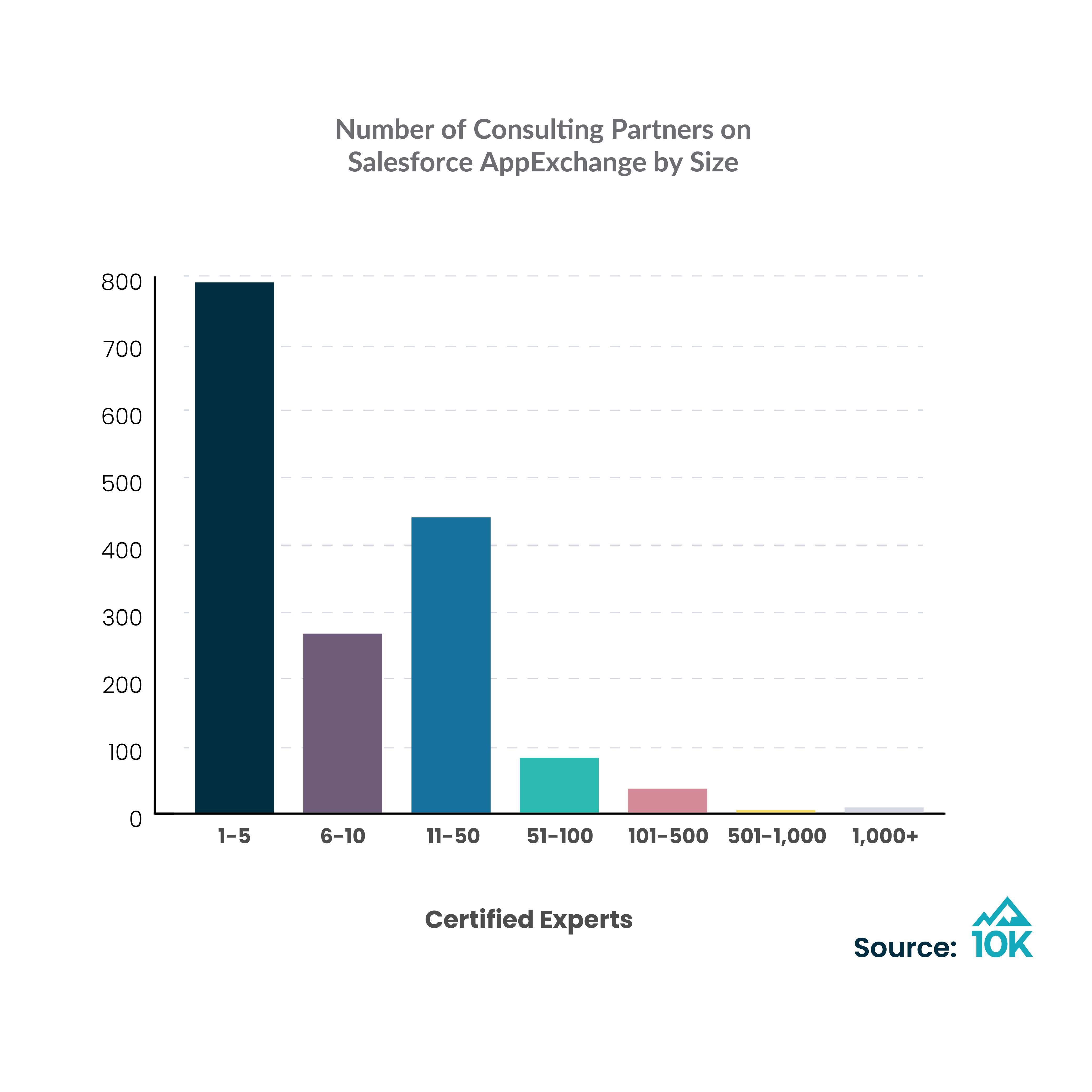The Salesforce talent marketplace is shifting, expanding, and evolving at the fastest pace I’ve seen in my 15 years of working within the ecosystem. From the rapid growth of the Salesforce independent consultant pool to freelance communities such as UpWork and Fiverr, Salesforce customers have more choice and access to on-demand and experienced talent than ever before.
While increasing access to talent is an excellent opportunity for maximizing program ROI, the great amount of choice can also make it difficult to know when and where to tap into this growing goldmine of talent. So what is the most effective approach to finding the right people and set of skills to bring a Salesforce system to life?
There isn’t a one-size-fits-all option. Here are the four main ways to source Salesforce talent:
- Hiring a recruiter to identify and vet full-time employees.
- Using one or more of the 1,500+ Salesforce consulting partners.
- Tapping into the growing pool of skilled freelancers.
- Partnering with a Salesforce talent broker.
There is no right option, only the option that is right for you. In this two-part post, I’ll walk through what I believe are the pros and cons of these different options.
Option 1: Full-Time Employees
Also known as an FTE, a full-time employee can give companies access to people who are well-versed in a company’s existing system and can be deployed across a business as needed.
While we believe any role or task can be conducted by an outside expert with the right person and the right structure in place, there are some things that are better left to internal, full-time staff when possible. These include:
Daily Administration: If your needs are primarily focused around the administration of reporting, security, and minor updates that require a quick turnaround time, it’s most optimal to have someone internal take those on rather than outsourcing.
End-User Support: Similar to the daily administration tasks, you want the person/people handling end-user support to have a solid understanding of your business and your org so they can triage issues and provide support based on the context of why things are the way they are.
(Some) Release Management
While a lot of companies (including 10K) can provide guidance on the process and toolset to use, ultimately there are some companies that don’t want a third party touching their production instance. We get it. As we’ve mentioned in our recent Handbook for Salesforce Operational Excellence, it’s a good idea to have someone internally own the release management toolset and the overall process for release management.
However, in a market as hot as Salesforce, this approach might be too lengthy and expensive for some companies. For example, research we gathered in 2018 shows that it can take on average 62 days to get a full-time developer onboard, and can cost more than $22,000 USD in recruiting expenses. If the company is in a regulated and competitive industry like healthcare or financial services, it could take three to four months to find the right person and get them on board.
Option 2: Salesforce Consulting Partners
When hiring full-time employees isn’t an option for your company, the Salesforce partner ecosystem is an excellent resource to connect with the talent you need. Partner consulting companies range from household names with thousands of experts to boutique firms with a single Salesforce professional.
These organizations are in the business of supplying Salesforce skills for any kind and size of Salesforce implementation, integration, or custom development project, and are a great option for companies who need to take on large transformation projects or supplement their internal team’s skills and capacity on a project basis. Hourly rates for consultants range dramatically based on the type of partner, region, skill level, and more, but expect to pay between $125 – $300 USD per hour across technical and non-technical roles in both established and emerging markets.
As mentioned, the number of Salesforce professionals a consulting partner offers can range from just one to thousands. They offer two very different consulting experiences.
Large Salesforce partners
As of late 2020, the top three consulting partners in the ecosystem (Accenture, Deloitte, and Cognizant) still comprise the vast majority of certified experts. Each grew the number of certified experts they report to Salesforce AppExchange by more than 25% YoY, with Accenture expanding their team the most (growing 36% YoY).
These global partners provide access to a massive network of professionals with expertise across a number of areas (important for large implementations) and a level of assurance that they know what they’re doing. However, these partners have the same challenge as Salesforce customers looking to hire and keep full-time talent, which means customers will be paying for the overhead associated with recruiting, training, and supporting these armies of consultants and may see a lot of turnover on their teams.
Small Salesforce partners
Our 2020 Salesforce Talent Ecosystem report found that more than 90% of registered partners on the Salesforce AppExchange have 50 or fewer experts. Nearly half of all partners have five or fewer certified experts.

Many of these firms, while small in size, were founded by highly experienced professionals and may employ some of the ecosystem’s top talent, with rare and specialized skills and experience companies might need and have trouble sourcing. However, because of their size, limited marketing budgets, and the sheer number of them out there, customers may find it virtually impossible to find, vet, and engage with the right firm for them.
Stay tuned for part two, where we’ll outline how to tap into the growing freelance market and how to partner with a Salesforce talent broker.



